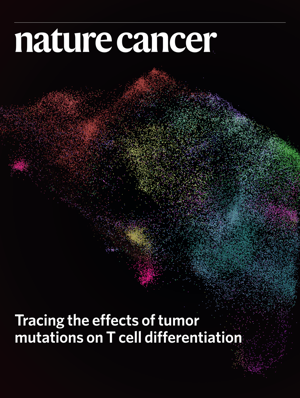投稿信息
稿件收录要求
Cancer is a devastating disease that causes one in six deaths globally. A large proportion of these deaths could be prevented, but improving prevention and treatment outcomes requires accurate diagnosis, the development of effective and precise treatment modalities and a better understanding of the socioeconomic factors that affect cancer incidence, prevalence and mortality.
Nature Cancer aims to provide a unique forum through which the cancer community will learn about the latest, most significant cancer-related advances across the life, physical, applied and social sciences. Areas of interest include fundamental, preclinical research that furthers our understanding of the mechanisms underlying tumour initiation, propagation and progression; work aiming to translate this knowledge to the clinic by focusing on new approaches for the development and delivery of diagnostic and therapeutic modalities; clinical studies informing cancer diagnosis, treatment and prevention; and new ways of understanding the global societal impact of cancer.
In addition to publishing original research, Nature Cancer will publish Comments, Reviews, News & Views, Features and Correspondence of high significance across the range of disciplines relating to cancer research.
Topics covered in the journal include:
• Cancer biology, encompassing oncogenic and tumour-suppressive mechanisms that deregulate molecular pathways and cellular processes, including tumour-initiating cells/cancer stem cells
• Cancer genetics and genomics, including functional genomics and the mechanisms underlying genome integrity, genomic instability and mutation
• Tumour evolution and heterogeneity
• Tumour–host interactions, including the tumour microenvironment (molecular, cellular, physical) and systemic effects
• Tumour immunology and immunotherapy
• Metastasis, including mechanisms of cancer cell dissemination, seeding, dormancy and growth in secondary sites
• Therapy, including design and delivery, targeted, combination and precision therapy and the study of therapy resistance
• Clinical work that informs cancer diagnosis, treatment and prevention
• Cancer models and methodology to investigate, diagnose and treat cancer
• Systems biology, including large-scale and single-cell omics and multi-omics approaches to characterise and study cancer
• Social, ethical and policy issues relating to cancer research, prevention, diagnosis and treatment




